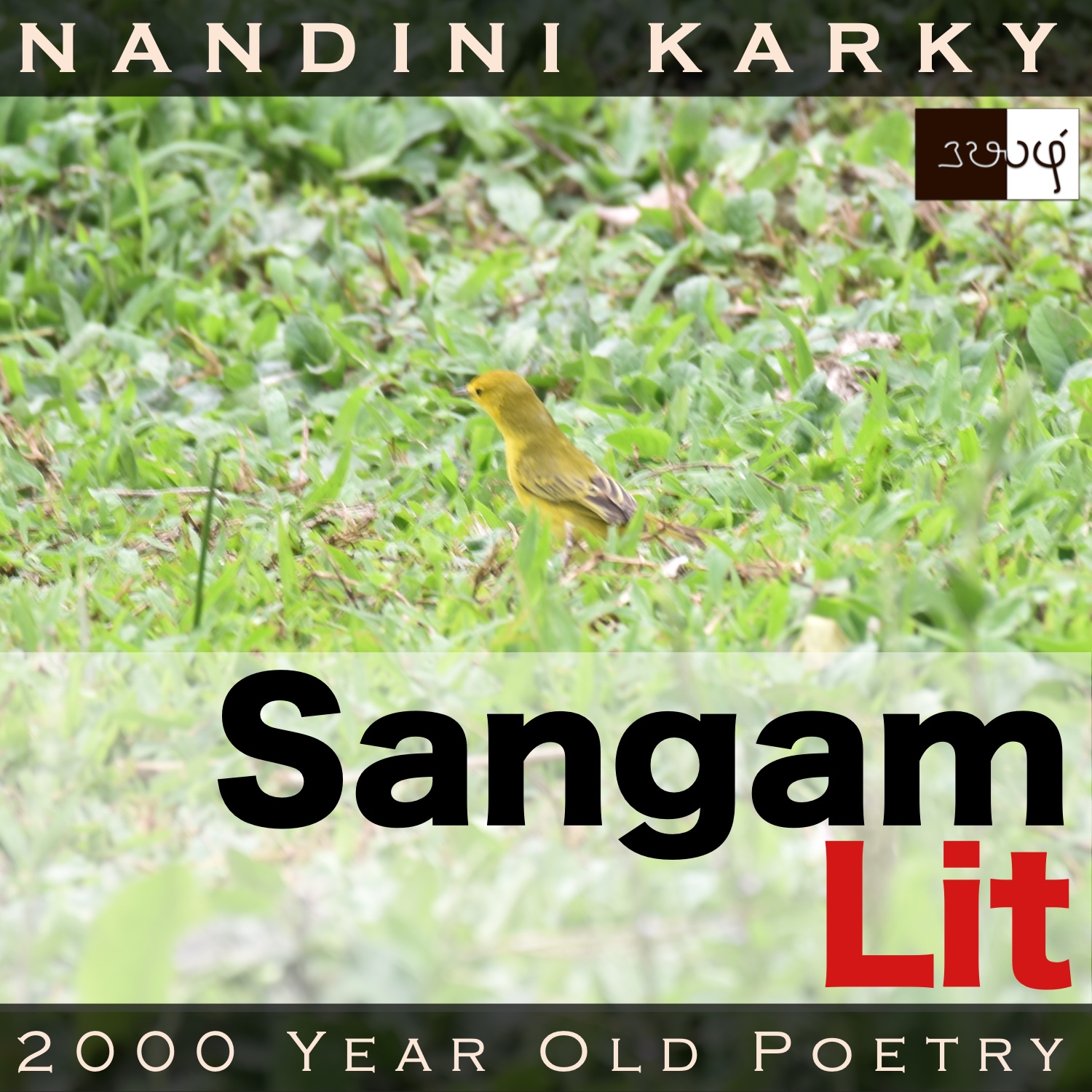Podcast: Play in new window | Download
Subscribe: Apple Podcasts | Spotify | Amazon Music | Android | iHeartRadio | TuneIn | RSS | More

In this episode, we perceive elements of a lady’s life in the mountain country, as depicted in Sangam literary work, Natrinai 368, penned by Kabilar. The verse is situated in the hills of ‘Kurinji’ and speaks in the voice of the confidante to the man, subtly persuading him to seek the lady’s hand in marriage.
பெரும் புனம் கவரும் சிறு கிளி ஓப்பி,
கருங் கால் வேங்கை ஊசல் தூங்கி,
கோடு ஏந்து அல்குல் தழை அணிந்து, நும்மொடு
ஆடினம் வருதலின் இனியதும் உண்டோ?
நெறி படு கூழைக் கார் முதிர்பு இருந்த
வெறி கமழ் கொண்ட நாற்றமும், சிறிய
பசலை பாய்தரு நுதலும், நோக்கி,
வறிது உகு நெஞ்சினள், பிறிது ஒன்று சுட்டி,
வெய்ய உயிர்த்தனள் யாயே-
ஐய!-அஞ்சினம், அளியம் யாமே!
Opening with ‘பெரும் புனம் கவரும் சிறு கிளி’ meaning ‘a small parrot that steals from huge fields’, the verse reflects this oft-mentioned image and its implication of how agriculture was a prominent aspect even in the hard-to-cultivate, wild mountains. ‘வேங்கை ஊசல் தூங்கி’ sketches for us, the joyous portrait of someone ‘swaying on a swing tied to a Kino tree’. The question ‘இனியதும் உண்டோ’ meaning ‘could there be anything more pleasant?’ launches one into a sweet reverie. The words ‘சிறிய பசலை பாய்தரு நுதலும்’ meaning ‘the spreading pallor on the forehead’ talk about the predominant feminine affliction of the Sangam times. ‘வெய்ய உயிர்த்தனள் யாயே’ conjures an image of ‘a mother letting out a sigh’. Wonder what’s bothering her! The verse ends with ‘அளியம் யாமே’ meaning ‘to be pitied, we are’ and invites us to listen to the story within.
The man and lady had been leading a love relationship and the man had been trysting with the lady for a while. Although the confidante was persuading him in hidden and overt ways, the man seemed intent only on trysting. One day, when he arrives by the lady’s house, the confidante says to him, “Could there be anything sweeter than chasing little parrots from the huge fields, swaying on the swing tied to the black-trunked ‘vengai’ tree, wearing leaves on uplifted loins and playing in your company? However, inhaling the new fragrance on her perfect, rich black tresses and glancing at the pallor spreading a little on her forehead, mother seemed to be emptied of good cheer. Then, pointing to something else, she let out a sigh. O lord, this frightens us. Pitiable indeed, we are!” With these words, the confidante conveys the doubts in mother’s mind, which would inevitably lead to confinement and thereby, subtly persuades the man to slay the lady’s sorrow by seeking her hand.
Time to delve deeper! The confidante assures the man that the lady finds the greatest of pleasure only in the company of the man, be it chasing parrots from the fields, or swaying on the swings or wearing the fine leaves that he brings to her. Although that may be the case, the confidante adds that there has been some troubling developments at home. She clarifies how mother had caught a whiff of the new smells emanating from the lady’s thick tresses and also noted, how a layer of pallor had spread on the lady’s forehead. The reason for those new smells are the various flowers that the man brings to the lady, the gifts of those times! Those fragrant flowers seem to leave behind their strong scent that confuses mother. Added to this, is the lady missing the man whenever he leaves her to return to his village, which results in pallor spreading on her skin. Mother noticing all this seemed to be confused and losing her calm. However, she would not express her disturbance directly but could be seen sighing at some unrelated thing. Relating this entire story to the man, the confidante expresses how the lady now fears that she will be confined to the home and if that were the case, she would lose the joy of the man’s company. Saying this, the confidante presents the lady’s sorrow-filled state and hopes that the man would be moved to seek the path to permanent happiness.
What strikes me in this verse is the acute power of observation in the people then. Take the case of the confidante, who infers so much from mother’s mere sigh! Mother too, seems to sense that different smell in her daughter’s hair and see even minute traces of change in her appearance. Speaking of which, what could be this pallor that becomes instantly visible when the man goes missing even for an evening? Did an ancient mind exert so much influence on the body to visibly express its angst or were the eyes of those people so perceptive to catch these tiny variations? These are questions that have no evident answers but they do seem to point us in the path of living life fully by nurturing this thoughtful sensitivity to those around us!




Share your thoughts...